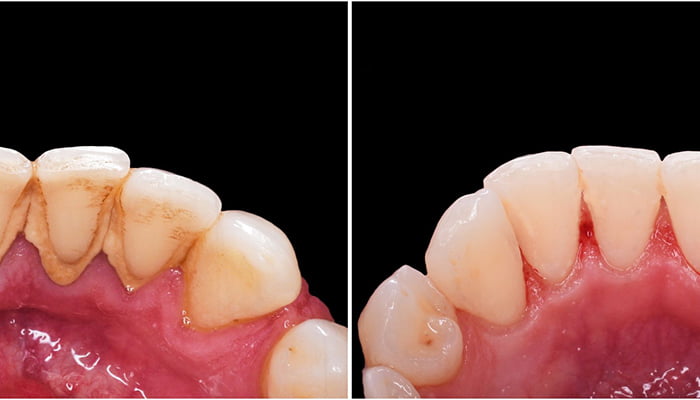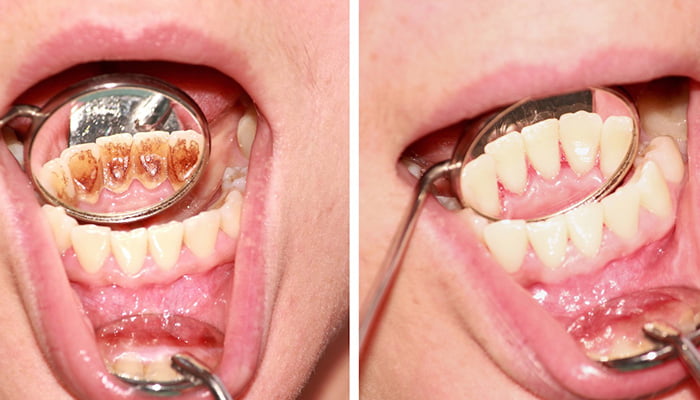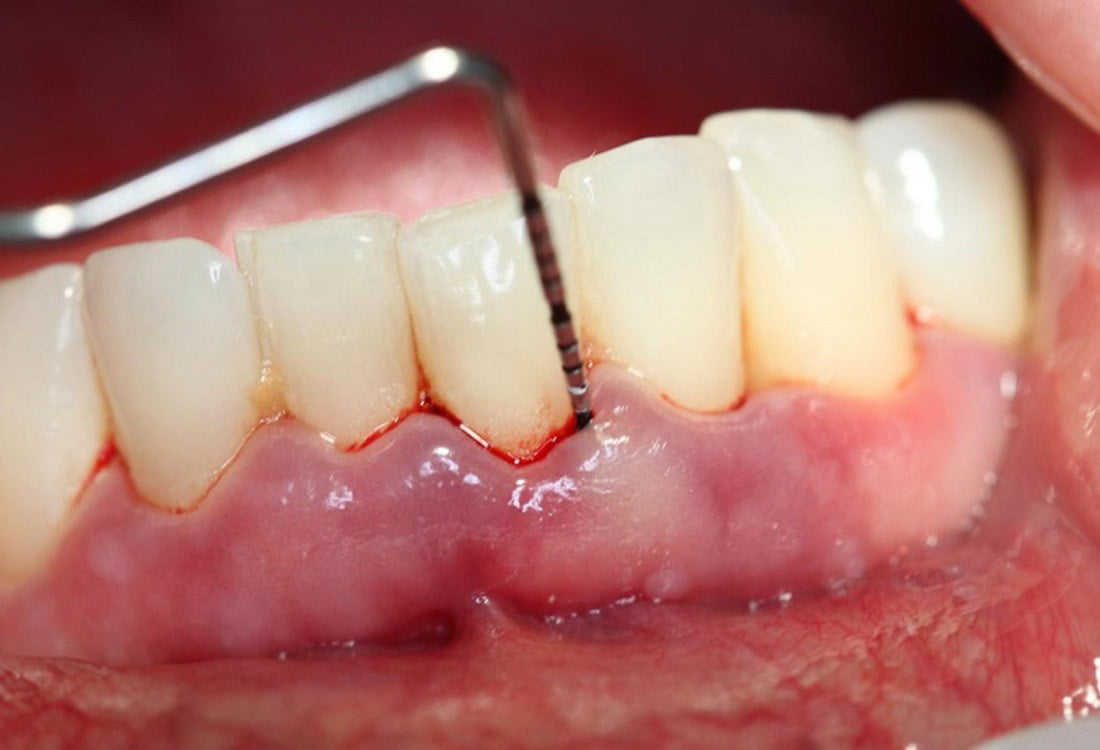Gum disease can be avoided and combated with good dental hygiene. But occasionally, a dentist will advise having your teeth deep cleaned. What you need to know about deep cleaning your teeth, including the disadvantages of deep cleaning teeth, is provided below.
What is deep teeth cleaning?
Scaling and root planing, also known as “deep cleaning,” is a dental technique that removes plaque and tartar from teeth above and below the gum line. A common prerequisite for this procedure is periodontitis, also known as gum disease. Special tools will be used by the dentist or dental hygienist to scrape tartar and plaque off the chewing surfaces and root surfaces of the teeth. For the same reason, they may file down rough spots on tooth roots to prevent bacteria from accumulating and exacerbating the illness.
Professional teeth cleaning normally necessitates two or more visits to the dentist. In some circumstances, antibiotic treatment may be suggested to remove any leftover germs and reduce gum discomfort. Regular dental care, such as brushing, flossing, and dental checkups, can help prevent plaque and tartar buildup, as well as gum disease.
How to Know You Need a Dental Deep Cleaning
Gum disease can not often create discomfort or apparent symptoms, which makes it difficult to notice when comprehensive cleaning is required. When you see your dentist for a checkup or routine cleaning, he or she might examine your gums to see whether they need to be deep cleaned.
You should be on the lookout for the following warning signs:
- Gum bleeding or redness
- Gums that are puffy and sensitive
- Halitosis (chronic foul breath) (persistent bad breath)
- You have an unpleasant taste in your mouth.
- Gums receding
You might also notice that some of your teeth are a little loose. Furthermore, if your gums hurt when you chew or brush, you may have gum disease and require deep cleaning.
Remember: While it may seem inconvenient to visit your dentist on a regular basis for checkups or cleanings, doing so may result in lower dental costs and less need for more extensive treatments in the future.
Read more: How much does it deep cleaning tooth cost
Pros of deep cleaning
- Stops gum disease
- Fights bad breath
- Protects roots of teeth
- Promotes healthy gums
- Prevents tooth loss
Cons of deep cleaning
- Slight pain and sensitivity
- Can cause gum recession
- Risk of infection after the procedure
- In very rare cases, a risk of nerve damage
What are the advantages of deep cleaning teeth?
Scaling and root planing is a dental technique that removes plaque, tartar, and bacteria from the tooth’s surface, including the area below the gum line. The most likely candidates are those who have not had their teeth professionally cleaned in a long time or who have gum disease. Consider the following potential advantages of a weekly thorough dental cleaning:
- Promotes healthier gums: By removing harmful germs and plaque that has accumulated on the teeth and gums, a thorough cleaning can help restore gum health.
- Aids in the treatment of current infections. You can easily practice your oral hygiene routine after a deep cleaning procedure to help your gum disease treatment work.
- The removal of plaque and tartar during a deep cleaning can significantly reduce a person’s risk of developing gum disease. This potentially fatal condition can also cause tooth loss.
- Removes bad breath. One advantage of thorough cleaning is that it removes the microorganisms that cause bad breath.
- It safeguards your roots and jawbones. Removes germs and plaque that can lead to gum disease and tooth loss; by using this method, you can help keep your teeth as long as possible. The removal of germs and plaque that cause tooth decay and gum disease during deep cleaning improves the overall health of your mouth.
It is recommended that you visit a dentist for a thorough cleaning, but it is not necessary for everyone to have a deep cleaning every week. It is best to consult with your dentist about your specific needs before deciding on a cleaning schedule.

What are the disadvantages of deep cleaning teeth?
While there are many advantages to having your teeth professionally cleaned, there are some disadvantages to consider. The following are some potential disadvantages of depth dental cleaning – a performing weekly:
- This level of discomfort may be normal. A thorough deep cleaning includes scaling, which is the removal of tartar and plaque from the surface of the teeth, and root planing, which is the smoothing out of rough spots on the teeth’s roots. Some patients, particularly those with particularly sensitive teeth or gums, may experience discomfort during these treatments.
- It may take a lot of effort in some cases: When you go to the dentist for deep cleaning, you should plan on spending between thirty minutes and an hour. This can be inconvenient if you have a busy schedule.
- It is not always inexpensive to spend money on it: Deep cleaning is frequently not covered by dental insurance, making it an expensive extra expense.
- It is possible that some people will not require it: People who have not had their teeth cleaned properly in a long time or who have gum disease are frequently advised to have a deep cleaning. If you visit the dentist regularly and practice good dental hygiene, you may not need a deep cleaning.
- Tooth sensitivity is increased. Deep cleaning removes plaque and tartar, exposing the tooth’s bare enamel. This procedure necessitates some mild to moderate scaling and planning below the gum line, which may result in gum bleeding and swelling.
- Gum recession: After a deep cleaning, bleeding gums may cause gum recession.
- Nerve damage: Because of weakened teeth, some people are more vulnerable to nerve damage. Though this rarely occurs, it is critical to notify your dental practitioner of any basic health issues so that he or she is aware of any potential complications.

What does deep cleaning teeth involve?
Deep cleanings of the teeth are distinct from regular cleanings. Plaque and tartar are removed from above the gumline with routine cleaning. On the other hand, a deep cleaning eliminates plaque and tartar from below the gum line.
See more: Deep cleaning teeth at home
Deep cleaning involves gum scaling and root planing
Gum scaling and root planing are two aspects of deep cleaning. Deep cleanings are typically performed over two or more visits and include gum scaling and root planing. Each visit can last between 1 and 2 hours. At the tooth scaling appointment, your dentist will remove plaque and tartar from beneath the gum line. During a root planning appointment, your dentist removes plaque and tartar from the roots of your teeth. This reduces the space between your teeth and gums, allowing your gums to reattach to the teeth.
You may need to take antibiotics
You may need to take an antibiotic for a few days if your immune system is weak. This is due to the possibility of infection following the procedure. Furthermore, thorough dental cleanings occasionally cause the release of bacteria into the bloodstream.
Is deep cleaning painful?
Because teeth scaling and root planing can be uncomfortable, your gums will be numbed with a topical or local anesthetic. After your treatment, you should anticipate some sensitivity. You might also experience some minor bleeding and swollen gums.
How to reduce sensitivity after the procedure
After your procedure, consuming soft foods like yogurt, applesauce, or mashed potatoes can help lessen sensitivity. Additionally, stay away from extremely hot or cold foods and beverages.
Acetaminophen and ibuprofen, as well as gargling with warm salt water, are examples of over-the-counter medications that can be used to treat pain and inflammation.
Regular tooth brushing and flossing aid in the healing process and lessen gum inflammation overall. At least twice daily, brush your teeth with a soft brush, and floss at least once.
Conclusion
Daily brushing and flossing are essential for maintaining good oral health. That’s why every time you visit, your dentist will remind you to do it. It benefits your gums in addition to your teeth. You can avoid needing to have a deep cleaning procedure done on your teeth by maintaining good oral hygiene at home. Consider the possibility that periodontitis and gingivitis mean you do require the procedure. In that case, speak with a local dentist about the benefits, what you need to understand about the procedure, and what you can do at home to maintain healthy teeth and gums in the future. Get in touch with teeth cleaning Marysville at Ohio to arrange a weekly deep cleaning.




One Response
I find it surprising that regular teeth cleaning services can help you remove plaque and prevent buildup! I have a colleague who wants to improve her appearance so she can try blind dates this year. I should talk to her about finding a dentist that offers these services as a start. https://www.livingdentalhealth.com/general-dentist-bend-or/